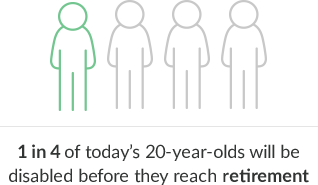
Most people don't think they're at risk of becoming disabled, but according to the U.S. Social Security Administration, one in five Americans (56 million) are currently living with a physical or mental disability. Additionally, it's estimated that one in four of today's 20-year-olds will become disabled before reaching their retirement age.
Without a solid disability insurance plan, your family could be at a significant risk if something unexpected happened, especially if you contribute to monthly household bills or a mortgage (most American households rely on two incomes to pay the mortgage). Relying on Social Security Disability to protect you may not be enough: it's very difficult to qualify for Social Security Disability benefits. The Social Security Administration uses a strict definition of "disability" and requires that you be unable to work in any occupation you would otherwise be qualified for based on your education, job experience and training.
Disability insurance purchased through an insurance professional generally uses an "own occupation" definition of disability rather than the "any occupation" definition used by the Social Security Administration, so proving you have a disability is less burdensome.
Like any insurance policy, you will need to apply for coverage and make regular premium payments to keep your policy in force. Disability income insurance can be purchased as a stand-alone policy, or as an added endorsement on your life insurance policy.
In the event you were to become disabled, your policy would specify how long the "elimination period" would be before benefits begin. After that elimination period, if you were still disabled and unable to work, the policy would pay you the benefit amount specified in the policy, for the length of time specified in the policy.
Your monthly disability income insurance payments during periods of disability are designed to provide you with some supplemental income during the period you are unable to work. This can help you continue paying your mortgage and other bills.
The primary benefit of disability insurance is that it can provide paycheck protection or replace a significant portion of your income if you become disabled. This means your family could continue their current standard of living, knowing that the mortgage payment or rent payment would continue to be paid, whether you were able to work or not.
While you may have some disability insurance offered through your employer, purchasing your own separate disability coverage gives you peace of mind knowing you'll have coverage even if you change jobs and lose those current employee benefits. Also, disability insurance can help you avoid the frustration and delays that can come with relying on Social Security Disability.
One major benefit of disability insurance is the paycheck protection it offers if you become disabled. You can feel safe knowing that your family will be able to continue paying the rent or mortgage even if you are out of work. Additionally, having this insurance on hand can be useful even if you get disability through your employer.
When you purchase your own policy, you don’t have to worry about suddenly losing coverage if you leave your current employer and get a new job. And, as discussed above, buying a disability insurance policy can help you avoid the frustration and delays that can come with relying on Social Security Disability, only to find out that you are not actually disabled in the eyes of the Social Security Administration.
